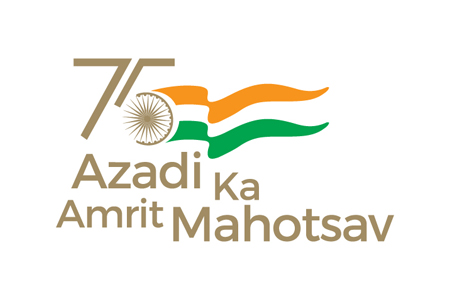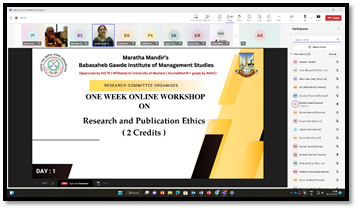Research and Publication Ethics Course (Credit 02)
Date: 5th – 9th May 2025
Organized by: Research Committee, MMBGIMS
Mode: Online via MS Teams
Participants: 80 (including students and faculty)
The Research Committee of Maratha Mandir’s Babasaheb Gawde Institute of Management Studies (MMBGIMS) successfully organized a five-day online workshop on Research and Publication Ethics from 5th to 9th May 2025. The course, carrying a credit of 02, aimed to strengthen participants’ understanding of ethical research practices, methodological precision, and the responsible use of technology in academic writing.
This workshop was specially designed for research scholars and postgraduate students, encouraging them to uphold integrity and rigor in their academic pursuits.
Session-wise Overview:
- Day 1: Ethical Considerations in Research
Speaker: Dr. Vidya Hattangadi, Director, MMBGIMS
The session introduced the fundamentals of research ethics including confidentiality, informed consent, data integrity, and avoiding plagiarism, along with real-life case discussions.
- Day 2: Correlation Between Variables and Hypothesis
Speaker: Kaleem Khan
Participants explored the distinction between constructs and measurable variables, types of variables, and steps to develop valid, testable hypotheses grounded in literature.
- Day 3: Connecting the Dots in Research
Speaker: C. R. Chavan
This session emphasized the logical flow of a research study — from problem statement to methodology, highlighting how each component must cohesively align to support conclusions.
- Day 4: Using Artificial Intelligence in Academic Writing and Research
Speaker: Rajesh Devasia
A cutting-edge session that demonstrated the ethical use of AI tools like Grammarly, Turnitin, and ChatGPT in research activities such as literature review, referencing, and writing assistance.
- Day 5: Concluding Session and Final Assessment
Speaker: Dr. Vidya Hattangadi
The workshop concluded with a reflective recap of key learnings and an engaging assessment using caselets. Participants applied their knowledge to practical scenarios, reinforcing their understanding of ethical research practices.
Key Highlights:
- Highly interactive sessions with real-world examples and live demonstrations
- Day-wise assessments and caselet-based learning to ensure practical understanding
- Excellent feedback from participants appreciating the clarity, relevance, and application-oriented approach of the workshop
- Consistent and effective anchoring by Ms. Sadiya Fuggawala and Mr. Pranav Indulkar ensured smooth coordination throughout the event
Conclusion:
The five-day workshop not only deepened participants’ understanding of research ethics and methodology but also inspired them to adopt ethical and systematic approaches in their academic journey. It was a successful initiative that reinforced MMBGIMS’s commitment to fostering a culture of responsible research and academic excellence.


